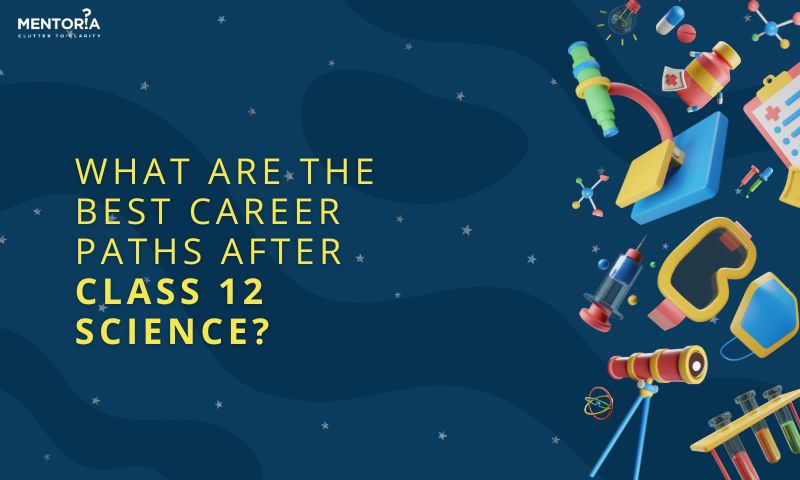What Are The Best Career Paths After Class 12 Science?

Deciding on a suitable career path after completing your 12th grade can be quite overwhelming for students. The initial query that pops up in student’s minds is, “What should I pursue after 12th science?” Students opt for science in their 12th standard as it offers a wide range of promising fields that resonate with their interests. Nevertheless, it is crucial for them to thoroughly research the different job prospects in the science domain after the 12th grade that align with their preferences.
In this article, we will help you navigate the maze of career choices and find the perfect path for you. Uncover valuable insights about the entrance exams that lie ahead after completing 12th grade in the science stream, and delve into the exciting world of promising career opportunities.
Popular Entrance Exams For Class 12 Science Students
As a Class 12 Science student, you have a wide range of entrance exams to choose from, depending on your career goals and interests. Here are some of the most popular entrance exams you should be aware of:
Joint Entrance Examination (JEE)
The Joint Entrance Examination (Main) is a popular engineering entrance exam in India, organised by the National Testing Agency (NTA). In the past, the Central Board of Secondary Education (CBSE) used to conduct this exam. It is designed for students who wish to pursue undergraduate Programmes like BE, B.Tech, and B.Arch at different institutions including NITs, IIITs, centrally funded technical institutions, state, government-funded institutions, and other participating institutions.
JEE opens the doors to some of the most prestigious engineering institutes in India, such as the IITs and NITs. It is split into two levels – JEE Main and JEE Advanced. The National Testing Agency (NTA) conducts JEE Main as a screening test for JEE Advanced. To be eligible for JEE Main, you need to have completed Class 12 with Physics, Chemistry, and Mathematics as your core subjects. The online exam is made up of multiple-choice questions. JEE Advanced is the next step for those who pass JEE Main and it allows them to get into the IITs. Here are key details about JEE:
JEE Main
JEE Main acts as the initial stage of the examination, paving the way for aspiring engineers. Administered by the esteemed National Testing Agency (NTA), this test serves as the gateway to secure admission into prestigious undergraduate engineering programmes at NITs, IIITs, and various other centrally funded technical institutions.
JEE Advanced
JEE Advanced is the second stage and is meant for admission to the Indian Institutes of Technology (IITs). Only candidates who qualify in JEE Main are eligible to appear for JEE Advanced.
Eligibility Criteria
To be eligible for JEE Main, candidates should have finished their 10+2 or an equivalent course with Physics, Chemistry, and Mathematics. However, for JEE Advanced, only a few students are qualified from JEE Main.
Exam Structure (JEE Main)
The JEE Main exam consists of two papers – Paper 1 for B.E./B.Tech courses and Paper 2 for B.Arch and B.Planning courses. Paper 1 is conducted in Computer Based Test (CBT) mode, while Paper 2 is conducted in Pen and Paper-based Test (PBT) mode.
Exam Structure (JEE Advanced)
JEE Advanced is a more challenging exam and is conducted in a fully computer-based test mode. It typically includes two papers with questions from Physics, Chemistry, and Mathematics.
Scoring
Both JEE Main and JEE Advanced use a scoring system. JEE Main scores are normalised to calculate the NTA score. JEE Advanced scores determine the ranking for admission to IITs.
Common Counseling (JoSAA)
Joint Seat Allocation Authority (JoSAA) conducts the centralised counselling process for admission to NITs, IITs, IIITs, and other GFTIs based on JEE Main and JEE Advanced ranks.
What’s New In JEE Main 2024?
The JEE (Main) 2024 examination has been scheduled to be conducted in two Sessions before the admissions for the academic year. This implies that students have two chances to improve their scores if they don’t perform well in their initial attempt, without wasting an entire academic year.
By taking the exam for the first time, students will gain valuable experience and learn from their mistakes, enabling them to work on their weaknesses in their subsequent attempts.
In case a candidate is unable to appear for the exam due to unforeseen circumstances, they won’t have to wait for a whole year to try again. Candidates don’t need to take the test in both sessions, but if they opt to do so, the highest score from their NTA scores will be considered.
National Eligibility Cum Entrance Test (NEET)
NEET is the ultimate gateway for students who aspire to pursue a career in the field of medicine, including MBBS, BDS, and other medical courses. The National Testing Agency (NTA) takes charge of organising this entrance exam, which serves as a common platform for medical enthusiasts all across India.
To be eligible for NEET, you must have completed Class 12 with Physics, Chemistry, and Biology as your core subjects. The exam itself comprises multiple-choice questions and follows the traditional pen-and-paper format. NEET is renowned for its fierce competition, and performing exceptionally well in this exam is vital for securing admission into prestigious medical colleges. Key details about NEET includes
Conducting Body
The National Testing Agency (NTA) administers the NEET examination, operating as an autonomous organisation under the Ministry of Education, Government of India.
Eligibility Criteria
Prospective candidates for undergraduate courses should have completed 10+2 or an equivalent qualification with Physics, Chemistry, Biology/Biotechnology, and English. Those aiming for postgraduate courses must hold a recognised MBBS degree.
Exam Structure (UG)
NEET-UG involves a single paper with 180 multiple-choice questions covering Physics, Chemistry, Zoology, and Botany. The duration of the exam is three hours.
Exam Structure (PG)
NEET-PG evaluates candidates for admission to postgraduate medical courses through a computer-based test featuring questions from various medical science subjects.
Result And Counselling
NEET results determine candidates’ ranks based on their performance. Counselling for seat allocation is managed by the Medical Counseling Committee (MCC) for undergraduate courses and respective state authorities for state-level counselling.
All-India Quota And State Quotas
NEET facilitates both All-India Quota seats and State Quota seats, with a significant percentage of seats in government medical colleges across states reserved for candidates qualifying through NEET.
Validity
NEET scores remain generally valid for one year for undergraduate courses and until the completion of the academic year for postgraduate courses.
Marking Scheme
- A total of 200 questions will be asked out of which candidates will have to answer 180 questions
- Total marks- 720
- 4 marks will be awarded for each correct answer
- One mark will be deducted for each wrong attempt
- No marks for unanswered questions.
Birla Institute Of Technology And Science Admission Test (BITSAT)
BITSAT is the key that unlocks the doors to the esteemed Birla Institute of Technology and Science (BITS), a renowned institution for engineering programmes in India. This computer-based examination evaluates your skills in Physics, Chemistry, Mathematics, English, and Logical Reasoning. To be eligible for BITSAT, you must have completed Class 12 with Physics, Chemistry, and Mathematics as your primary subjects. The test consists of multiple-choice questions and spans three hours. Achieving excellence in BITSAT paves the way for admission into a wide range of undergraduate engineering courses offered by BITS. Here are key details about BITSAT:
Conducting Body
BITSAT is conducted by BITS Pilani, a prestigious private institute with campuses in Pilani, Goa, Hyderabad, and Dubai.
Courses Offered
BITSAT is the entrance exam for admission to various integrated First Degree programmes, including B.E (Hons.), B.Pharm (Hons.), M.Sc (Hons.), and M.Sc (Tech.).
Eligibility Criteria
To be eligible for consideration, applicants must have successfully completed the 10+2 examination with a strong foundation in Physics, Chemistry, and Mathematics (or Biology). Fluency in English is also a must. Keep in mind that certain programmes may have additional criteria for eligibility.
Exam Pattern
BITSAT assesses candidates in Physics, Chemistry, Mathematics, Logical Reasoning, and English Proficiency. The exam is computer-based and includes objective-type questions. There is also a provision for unattempted questions.
Result And Admission
BITSAT results determine candidates’ scores and ranks. Admission is based on merit, and candidates can apply for admission to BITS Pilani, Goa, or Hyderabad campuses based on their preferences and scores.
Career Options After Class 12 Science
After completing Class 12 Science, you have a plethora of career options to explore. Let’s take a closer look at some of the popular career paths available to you:
Medical Career Paths
If you have a burning desire to make a positive impact on people’s lives and a fascination with the medical field, embarking on a healthcare career could be an incredibly rewarding choice. The realm of healthcare offers a multitude of exciting career paths for you to delve into.
- Medical Doctor (MBBS): Pursuing an MBBS degree is a great way to become a skilled medical practitioner. Many students choose this path to fulfil their dream of becoming doctors and helping patients with their medical needs.
- Dental Surgeon (BDS): If you are interested in oral health and want to specialise in dental care, pursuing a BDS degree can open doors to a career as a dental surgeon.
- Pharmacy: If you have a passion for the pharmaceutical industry and aspire to make a significant impact in the healthcare sector, consider embarking on a career in pharmacy. By becoming a registered pharmacist, you can actively contribute to patient care, or you can delve into the exciting realm of research and development within this field.
- Nursing: If you’re passionate about healthcare and want to make a difference, nursing could be the ideal career choice for you. As a registered nurse, you’ll play a vital role in caring for patients and working closely with individuals and families to enhance their health and well-being. Alternatively, you can also explore different avenues in nursing research or advanced practice nursing, where you can contribute to the advancement of healthcare delivery and innovation.
- Hospital Pharmacist: Hospital pharmacists are essential in distributing medications, advising patients on proper usage, and overseeing medication therapy. They collaborate closely with healthcare experts to guarantee the safe and efficient use of medications.
- Pharmaceutical Research: If you have a passion for research and development, a career in pharmaceutical research can be highly rewarding. Pharmaceutical researchers work on developing new drugs, conducting clinical trials, and exploring innovative treatment options.
Engineering Career Paths
For those with a knack for problem-solving and a passion for technology, a career in engineering can be a fulfilling choice. Some of the popular engineering branches you can consider are:
- Mechanical Engineering: This branch focuses on the design, development, and maintenance of mechanical systems. It offers opportunities in industries such as automotive, aerospace, and manufacturing.
- Computer Science Engineering: Computer Science Engineering is a highly sought-after field due to the rapid progress of technology. This branch opens up various career paths in software development, artificial intelligence, data science, and cybersecurity.
- Civil Engineering: Civil engineers are essential in the process of creating, constructing, and upkeeping infrastructure projects like buildings, bridges, and highways. This field offers a diverse array of career paths within the construction and infrastructure sectors.
- Chemical Engineering: Chemical engineers utilise the fundamentals of chemistry, physics, and mathematics to create and manage processes that produce chemicals, pharmaceuticals, fuels, and various materials. Their main objective is to enhance processes for maximum efficiency, safety, and sustainability.
- Electrical engineering: Electrical engineering is all about dealing with electricity, electronics, and electromagnetism. These engineers have the important task of creating, advancing, and examining electrical systems, which cover power generation, transmission, and distribution. Additionally, they also focus on electronic devices and circuits.
- Aerospace Engineering: Aerospace engineers are responsible for creating and building airplanes, spaceships, satellites, and missiles. They focus on areas like aerodynamics, propulsion systems, materials, and structures to guarantee secure and effective flight.
- Biomedical Engineering: Biomedical engineers use engineering principles in the realm of medicine and biology. They create and enhance medical equipment, prosthetics, and imaging systems, while also conducting research to advance healthcare technologies.
- Environmental Engineering: Environmental engineers are dedicated to safeguarding and enhancing the environment through tackling concerns like controlling pollution, treating water and wastewater, and managing resources sustainably.
Architecture Career Paths
If you possess a knack for creativity and a deep love for crafting environments, a profession in architecture could be the perfect match for you. Here are a few potential career paths within the field of architecture:
- Architect: Architects are in charge of conceptualising and organising structures that are visually appealing, practical, and environmentally friendly. They tackle a wide range of projects, from designing homes to constructing commercial complexes and public areas.
- Interior Designer: If you have a keen eye for aesthetics and enjoy creating beautiful and functional indoor spaces, a career as an interior designer could be a perfect choice. Interior designers work on projects such as residential homes, offices, hotels, and restaurants.
Agriculture Career Paths
For those interested in the agricultural sector and the environment, pursuing a career in agriculture can be both fulfilling and impactful. Here are some agriculture career paths to consider:
- Agricultural Scientist: These scientists are all about researching and coming up with new ways to boost crop production, make farming better, and tackle environmental issues. They’re all about sustainable agriculture and making sure we have enough food for everyone.
- Agribusiness Management: These managers are the ones who keep the agricultural sector running smoothly. They take care of marketing, supply chain management, finance, and policy development to make sure everything is working efficiently in agricultural businesses.
Dental sciences
Dental Sciences, a vibrant and indispensable field in the realm of healthcare, encompasses the exploration and application of oral health and hygiene. Aspiring dental professionals embark on Bachelor’s programmes such as Dental Surgery (BDS) to acquire a comprehensive understanding of dental anatomy, pathology, and treatment methodologies. The curriculum not only includes theoretical knowledge but also provides hands-on clinical training, enabling students to gain practical experience in preventive, diagnostic, and therapeutic dental care. Moreover, Dental Sciences extends its reach to specialised areas like Orthodontics, Periodontics, Endodontics, and Oral and Maxillofacial Surgery, offering avenues for profound expertise. Upon successful completion of the programme, graduates can contribute to oral healthcare by either becoming general dentists or pursuing advanced studies for specialisation. The role of dental professionals is pivotal in promoting overall health, underscoring the significance of oral well-being within the broader context of a patient’s overall well-being.
Forensic Science
Forensic Science is an intriguing field that applies scientific principles and techniques to solve crimes and legal matters. Choosing a career in Forensic Science means taking specialised courses that cover various disciplines like forensic biology, chemistry, toxicology, digital forensics, and criminalistics. These programmes provide individuals with the necessary skills to gather, analyse, and interpret crucial evidence for criminal investigations. Students explore areas such as crime scene investigation, forensic pathology, and forensic psychology, gaining expertise in using advanced technologies and methodologies. Graduates in Forensic Science often secure job opportunities in law enforcement agencies, crime laboratories, government organisations, and private consulting firms. The diverse nature of Forensic Science makes it an exciting and impactful field, playing a significant role in the administration of justice and the resolution of complex legal cases.
Defense Services
Individuals with aspirations of pursuing a career in Defense Services have the option to join the Indian Army, Navy, or Air Force. One of the common pathways to achieve this is through the National Defence Academy (NDA). The NDA is a highly esteemed institution that provides a comprehensive training programme for candidates who aspire to become officers in the armed forces. To gain entry into the NDA, candidates must endure a challenging selection procedure comprising a written examination, an interview, and a medical examination.
The curriculum at the NDA encompasses a wide range of subjects, such as military science, leadership, physical fitness, and academic courses. Upon graduation, successful candidates are commissioned as officers, fully prepared to serve in various capacities within the armed forces. In addition to the NDA, there are other defence-related exams like the Combined Defence Services (CDS) and the Air Force Common Admission Test (AFCAT) for specific branches. A career in Defense Services offers opportunities for leadership, adventure, and the chance to serve the nation, making it a noble and challenging path for individuals with a patriotic spirit and a strong commitment to national security.
A Roadmap To Success
Are you still unsure about what to do after finishing your 12th boards? countless opportunities are waiting for you if you just make up your mind and are willing to seize them. If you’re a Science student and still feeling confused about your next steps, we recommend taking a moment to sit back, take a deep breath, and relax. There are so many career options available in the science stream, so you can take your time to figure out where your interests truly lie. We hope that our list of career options after 12th Science has helped you narrow down your choices. Remember to keep learning and improving yourself for a brighter future ahead.
Discover Your Potential with Mentoria’s Student Guidance. Whether you’re aiming to excel in your studies, explore new academic paths, or switch to a different field, our mentors will craft a personalised plan for you. Offering various streams, 850+ courses, and insights into 12,000+ careers, we’re here to help you discover your ideal academic fit. Connect with our mentors today to kick-start your journey toward a fulfilling and successful student life.












